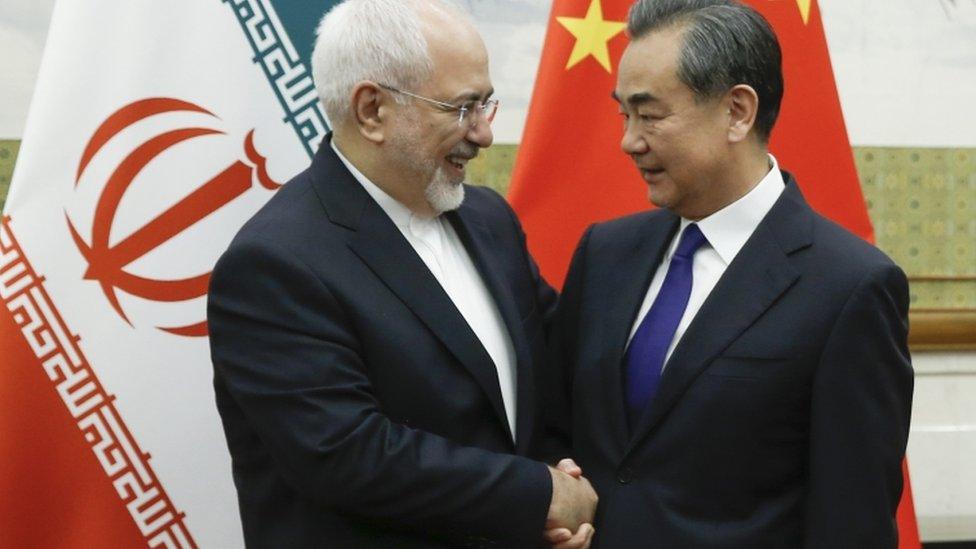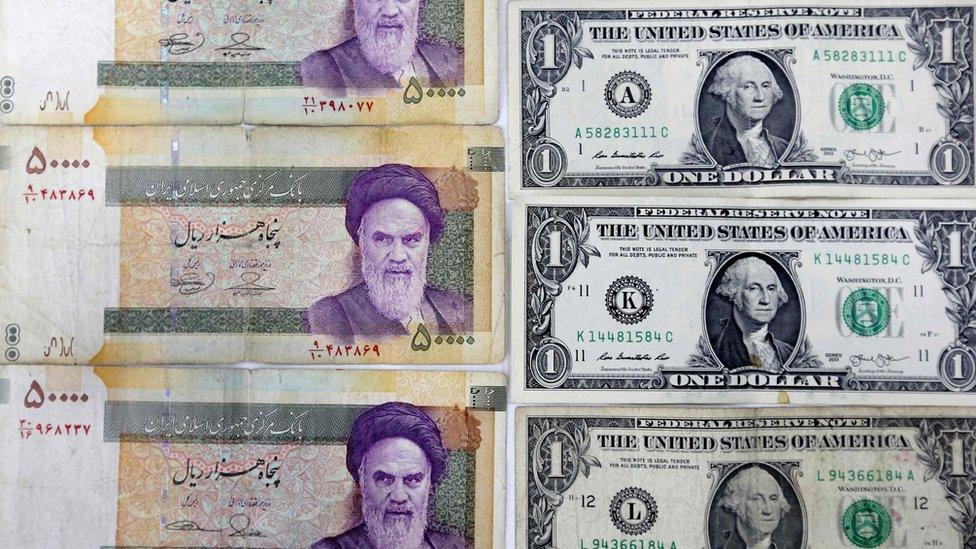Iran nuclear deal: Envoy starts diplomatic tour after US withdrawal
- Published

Javad Zarif's first stop was with Chinese Foreign Minister Wang Yi in Beijing
Iran's Foreign Minister Javad Zarif has begun a diplomatic tour to seek assurances that signatories to a landmark nuclear deal will back it despite its abandonment by the US.
Mr Zarif said on his first stop, China, that he hoped to secure a "clear future design" for the agreement.
The US will re-impose sanctions on Iran and firms dealing with it could be hit, angering signatories like France.
President Hassan Rouhani said he hoped Iran could stay in the agreement.
"If the remaining five countries continue to abide by the agreement, Iran will remain in the deal despite the will of America," he said.
The 2015 agreement sought to curb Iran's nuclear programme in return for the lifting of economic sanctions.
What is the Iran nuclear deal?
After meeting his counterpart in Beijing, Mr Zarif said: "We hope that with this visit to China and other countries we will be able to construct a clear future design for the comprehensive agreement."
But he added: "If the nuclear deal is to continue, the interests of the people of Iran must be assured."
He will later head to Moscow and Brussels.
UK Prime Minister Theresa May has had telephone talks with Mr Rouhani on a range of issues, a Downing Street spokesman said, reiterating to him that the UK and its European partners remained committed to the Iran nuclear deal.
"She said it is in both the UK and Iran's national security interests to maintain the deal and welcomed President Rouhani's public commitment to abide by its terms, adding that it is essential that Iran continues to meet its obligations," he said.
The British prime minister also raised the cases of the dual nationals being held in Iran, urging Hassan Rouhani to make further progress over the release of British-Iranians "on humanitarian grounds".
'Horrible' deal
European signatories have undertaken a flurry of diplomatic activity to try to protect trade deals worth billions. On Sunday, White House National Security Adviser John Bolton said sanctions on European firms were "possible".
Secretary of State Mike Pompeo said the US still wanted to work with the Europeans on a new deal.
Iran has threatened to resume "industrial scale" uranium enrichment "without any restrictions" if it does not get guarantees that the trade ties which have been established with Europe since the deal was signed will be maintained.
A timeline of what Trump's said about the Iran deal
A number of voices in Iran have suggested the deal is unlikely to survive.
The head of the influential Revolutionary Guards, Mohammad Ali Jafari, said: "I hope recent events will lead us to end our trust in the West and the Europeans."
Ayatollah Ali Jannati, the ultra-conservative head of the Assembly of Experts, said Mr Rouhani should "present his apologies to the Iranian people for the damage caused".
US President Donald Trump said the deal was "horrible" because of expiry dates on its restrictions and because it did not cover Iran's ballistic missile programme or its regional influence.
Analysis: What's next for the Iran deal? Barbara Plett Usher explains
- Published10 May 2018

- Published9 May 2018